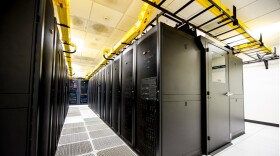Michigan’s top energy regulator has approved a plan to allow Consumers Energy to charge large data centers differently for their electricity usage.
The plan is meant to protect residential electricity customers from bearing the costs of infrastructure upgrades that could be coming to meet the demand for the power-hungry data centers.
“A core tenet of ratemaking is that customers are responsible for the costs they impose on the system and the costs required to serve them,” members of the Michigan Public Service Commission wrote in their decision on the case. “Residential, commercial, and other industrial customers should not have to pay for investments driven solely by large load additions.”
The decision requires that any new customer requiring 100 megawatts of power or more must:
- Pay a $100,000 upfront fee to Consumers
- Sign a minimum 15-year contract for electricity
- Pay for at least 80% of the requested capacity during the contract, even if actual usage goes below that
- Pay an exit fee if it no longer needs power
The decision also includes a ramp-up period of no more than five years leading into the 15-year contract, and automatic contract renewals for five years after that. The customer must give four years notice if it plans to end the contract.
The rates technically apply to any request for power that exceeds 100 megawatts, but in practice it will most likely affect data center customers, which require far more power than other large industrial sites. Consumers noted in its request for the new rate framework that its current largest customer uses only 28 megawatts of electricity.
The rise of artificial intelligence has created a need for data centers that use much more energy than that. CMS Energy, the parent company of Consumers, has announced it currently has an agreement to supply power to a yet-to-be-announced data center that expects to use up to one gigawatt of power, an amount of electricity roughly equivalent to the entire residential demand of the city of Detroit. And the MPSC noted in its decision that Consumers has received inquiries for enough data centers to require 15 gigawatts of power, which is more than double the utility’s current load.
Meeting that demand would require massive new investments by Consumers. The concern is that demand for artificial intelligence could drop after the data center is built. The electricity usage could be far below what was originally expected, or the data center could close down completely. And if that were to happen, Consumers’ other customers would be on the hook for the added upgrades.
By requiring long contract terms and minimum payments, the new plan aims to ensure data center owners will pay for the upgrades, not residential consumers.
Without guard rails from the public service commission order, it creates uncertainty about whether these large new customers will be powered by clean energy and ultimately help Michigan meet its clean energy goals.Derrell Slaughter, National Resources Defense Council
Environmental groups, which intervened in the filings in the case, praised the consumer protections in the order, but said it fell short on clean energy goals.
“The MPSC’s order makes strides on customer protection, ensuring that ratepayers aren’t subsidizing large customers like data centers,” said Derrell Slaughter, the Michigan Policy Director for Climate and Energy at the Natural Resources Defense Council.
“The Commission falls short on compliance with Michigan’s renewable and clean energy standards,” Slaughter added in the statement. “Without guard rails from the public service commission order, it creates uncertainty about whether these large new customers will be powered by clean energy and ultimately help Michigan meet its clean energy goals.”
The MPSC said in its order that the clean energy standards could be addressed in another case, and opted to make a determination on rates first in order to reach a more speedy decision.
The order issued Thursday applies only to customers of Consumer’s Energy, which supplies power mostly to the west side of the state.
DTE Energy so far has not requested a similar structure for large customers in its service area. That’s despite the announcement last week of a new data center in Washtenaw County that’s expected to use up to 1.4 gigawatts of electricity.
The data center will be built by Green Chile Ventures, a subsidiary of the tech giant Oracle, and supply AI computing power to OpenAI, the creator of ChatGPT.
DTE filed for approval of special contracts for the facility. Those contracts would require the company to buy electricity until 2045, and pay for at least 80% of its capacity during that time. They also allow DTE to build out new energy storage infrastructure, and recover the costs from the company.
“The framework reflects a reasonable and appropriate balance between the advantages of serving a new large load customer and protecting existing customers from risk and potential cost subsidies,” DTE wrote in its application for approval of the contracts.
The utility originally asked for expedited approval of the contracts, but the Michigan attorney general’s office has intervened in the case, asking for a public hearing.
“A public hearing is the only way to ensure transparency, give customers all the facts, and confirm DTE’s proposal truly protects Michiganders before any approval is granted,” Michigan attorney general Dana Nessel said in a statement.






